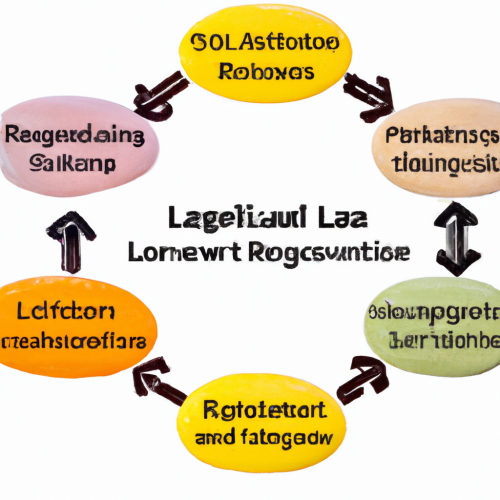Germany is not only renowned for its rich history, breathtaking landscapes, and world-class engineering, but it also boasts a thriving business landscape. With its robust economy, strategic location, skilled workforce, and commitment to innovation, Germany has become an attractive hub for both domestic and international enterprises. In this article, we will delve into the key factors that contribute to unlocking Germany’s business potential. From unravelling the country’s favorable economic policies and regulatory framework to exploring its diverse sectors and uncovering the secrets behind its unparalleled success, we will navigate through the intricacies of the German business landscape. Whether you are an aspiring entrepreneur, an investor seeking lucrative opportunities, or simply intrigued by the German economic miracle, join us as we embark on a journey to unlock Germany’s enticing business environment.
Understanding Germany’s Business Environment
Germany is renowned for its robust and dynamic business environment, which sets the stage for success and growth for both national and international companies. Understanding the various factors that contribute to this thriving ecosystem is crucial for anyone looking to establish or expand their business in Germany.
1. Strong economy: Germany boasts the largest national economy in Europe and is the fourth largest worldwide. This economic powerhouse is fueled by its diverse industries, including automotive, machinery, pharmaceuticals, and finance. Businesses benefit from a well-developed infrastructure, a skilled workforce, and access to global markets.
2. Stable political environment: Political stability is a key characteristic of Germany’s business landscape. The country has a robust legal system, transparent regulations, and a reliable legal framework that fosters fair competition and investor protection. The government consistently supports pro-business policies, creating a favorable environment for entrepreneurship and innovation.
3. Highly skilled workforce: Germany is internationally recognized for its excellent education system and highly skilled workforce. The country’s emphasis on apprenticeships and vocational training ensures a strong pool of competent professionals across various industries. Businesses in Germany benefit from this exceptional talent pool, contributing to their success and competitiveness in the global market.
4. Innovation and technological advancement: Germany has a long-standing tradition of innovation and technological excellence. With a strong focus on research and development, the country continually pushes the boundaries in sectors such as engineering, automotive, and information technology. The presence of renowned research institutions and a vibrant startup ecosystem further fuel this spirit of innovation.

Exploring Key Industries in Germany
Germany is well-known for its strong and diverse economy, boasting an array of key industries that have played a significant role in the country’s success. From automotive manufacturing to pharmaceuticals, Germany leads in various sectors, making it a global player in the world economy.
Automotive Industry: When it comes to automobiles, Germany stands out as a powerhouse with renowned brands like Volkswagen, BMW, and Mercedes-Benz. The German automotive industry is known for its exceptional engineering, innovation, and quality. With a strong focus on research and development, German automobile manufacturers are constantly pushing the boundaries of technology and sustainability.
Technology and Engineering: Germany is recognized globally for its expertise in technology and engineering. The country is home to numerous high-tech companies that produce cutting-edge machinery and equipment. From robotics to renewable energy, German technology firms are at the forefront of innovation and contribute significantly to the country’s economy.
Chemical and Pharmaceutical Industries: Germany is known for its world-leading chemical and pharmaceutical industries. Major German companies such as BASF, Bayer, and Merck are trailblazers in the field, constantly developing new medications and chemical substances. The country’s commitment to research and investment in scientific innovation has enabled it to maintain its position as a global leader in this sector.
Renewable Energy: Germany has made substantial strides in advancing renewable energy technologies. The country has been a pioneer in harnessing wind, solar, and other sources of clean energy. With a strong commitment towards sustainability, the renewable energy sector in Germany continues to grow and attract investors from around the world.

Navigating the Legal and Regulatory Framework
When conducting business, understanding and adhering to the legal and regulatory framework is vital to ensure compliance, mitigate risks, and foster a transparent and ethical environment. Here are some key considerations that can help you navigate this intricate landscape:
Stay up-to-date
Legislation and regulations are constantly evolving, so it is essential to stay informed about any changes that may impact your industry or organization. Regularly monitor official government websites, subscribe to industry newsletters, and engage with industry associations to stay abreast of legal and regulatory updates. Being proactive will assist you in maintaining compliance and adapting your practices accordingly.
Consult legal experts
Legal complexities can be challenging to navigate alone, especially when dealing with intricate or unfamiliar areas of the law. Engaging with knowledgeable legal professionals is always advisable to ensure you understand the implications of specific regulations and receive reliable advice. Lawyers with expertise in your industry can help interpret laws and provide guidance tailored to your unique circumstances.
Create internal policies and procedures
Establishing clear internal policies and procedures is crucial for maintaining legal and regulatory compliance within your organization. These guidelines should outline best practices, procedures for handling regulatory requirements, and mechanisms for ensuring adherence. Regularly review your policies and update them as needed to incorporate any legal changes and maintain a culture of compliance.
Building Relationships in the German Business Culture
German business culture places great emphasis on building strong relationships as a foundation for successful partnerships. Understanding the cultural nuances and etiquette when engaging in business interactions in Germany is essential for building trust and fostering long-term connections. Here are a few key insights to help you navigate the German business landscape with confidence.
1. Punctuality is paramount: Germans are known for their precision and value punctuality highly. Make sure you arrive on time for meetings and appointments, as tardiness is seen as disrespectful. It reflects your commitment and professionalism, which can contribute to earning the trust and respect of your German counterparts.
2. Formality in communication: Germans appreciate a certain level of formality in business communication. Addressing people by their last names and using “Herr” (Mr.) or ”Frau” (Mrs./Ms.) followed by their surname is considered the norm in initial encounters. It is also common to exchange business cards, preferably with a brief introduction or handshake.
3. Attention to detail: The German business culture values precision and thoroughness. When preparing for meetings, ensure that you have done extensive research and have all relevant facts and figures at hand. Presentations and proposals should be well-structured, detailed, and supported by data. Pay attention to accuracy and be prepared for detailed questions, as Germans appreciate a meticulous approach.
4. Building trust through reliability: German business partners value trust and reliability. Delivering on promises and meeting deadlines is crucial for establishing credibility. Consistency is key, and demonstrating your reliability over time will go a long way in fostering strong and long-lasting relationships in the German business culture.
Harnessing Technology to Drive Business Growth
In today’s rapidly evolving business landscape, harnessing technology has become more crucial than ever in driving business growth. With technological advancements shaping various industries, businesses that fail to adapt often find themselves falling behind their competitors. By leveraging technology effectively, organizations can streamline processes, improve productivity, and enhance customer experiences, ultimately leading to sustainable growth.
One way businesses can harness technology to drive growth is through the implementation of cloud computing solutions. Cloud computing offers numerous benefits, including scalability, cost-effectiveness, and increased data accessibility. By migrating their operations to the cloud, companies can reduce infrastructure costs, efficiently manage their resources, and easily adapt to changing business requirements. Moreover, cloud-based solutions enable seamless collaboration among teams, regardless of geographical limitations, thus fostering innovation and driving business growth.
Another area where technology can contribute to business growth is marketing and customer engagement. Utilizing various digital marketing strategies, such as search engine optimization, social media marketing, and personalized email campaigns, businesses can expand their reach, attract new customers, and retain existing ones. Additionally, data analytics tools can provide valuable insights into consumer behavior, allowing companies to make data-driven decisions and tailor their offerings to meet customer needs more effectively. By harnessing technology in marketing efforts, businesses can create targeted campaigns, enhance customer experiences, and ultimately drive business growth.
Furthermore, embracing emerging technologies like artificial intelligence (AI) and machine learning can propel a business towards growth. AI-powered solutions can automate repetitive tasks, enhance data analysis capabilities, and provide personalized recommendations to customers. For instance, by implementing chatbots on websites or social media platforms, businesses can offer quick and efficient customer support, increasing customer satisfaction and loyalty. Moreover, machine learning algorithms can analyze vast amounts of data to identify patterns and make accurate predictions, enabling companies to optimize operations, forecast market trends, and make informed business decisions.
Strategies for Success in the German Market
When it comes to expanding your business into the German market, having a solid strategy is crucial. Germany is known for its well-established economy and discerning consumers, so being prepared and understanding the unique aspects of this market can greatly increase your chances of success. Here are some strategies to consider:
- Localization: To connect with German consumers, it is essential to localize your products and services. This includes translating your website, marketing materials, and customer support into German. Additionally, adapting your products to meet local preferences and regulations can significantly enhance your chances of acceptance in this market.
- Build Trust: German consumers value trust and reliability in businesses. Emphasize your company’s credibility, track record, and any certifications or partnerships you have acquired. Demonstrating your commitment to quality, privacy, and customer satisfaction will go a long way in gaining their trust and loyalty.
- Understand Local Competition: Researching and analyzing your competitors in the German market is vital. Identify their strengths, weaknesses, pricing strategies, and market positioning. This knowledge will enable you to differentiate your offering and find gaps or opportunities that your business can exploit.
- Follow Legal Requirements: To operate successfully in the German market, it is crucial to comply with local laws, regulations, and certifications. Familiarize yourself with legal requirements related to taxation, data protection, employment, and more. Hiring local experts or consulting legal advisors can help ensure your business meets all necessary obligations.
By employing these strategies, you can position your business for success in the diverse and vibrant German market. Remember, patience and adaptability are key as building relationships and making an impact in any market takes time, and Germany is no exception.
To Conclude
In conclusion, unlocking Germany’s business landscape presents lucrative opportunities for both domestic and foreign investors. With its strong economy, highly skilled workforce, and strategic geographical location, Germany proves to be an ideal destination for business growth and expansion. However, it is crucial to navigate the unique aspects of the German business environment, such as its distinct corporate culture, rigorous regulations, and emphasis on quality and sustainability. By understanding these intricacies and leveraging Germany’s strengths, businesses can tap into its thriving market and foster long-term success. As we have explored throughout this article, embracing innovation, building strong partnerships, and staying attuned to market trends will be key factors in unlocking Germany’s business landscape and maximizing one’s potential in this competitive market. With careful planning, strategic insights, and a dedication to excellence, businesses can position themselves for success and thrive in Germany’s dynamic business ecosystem.





